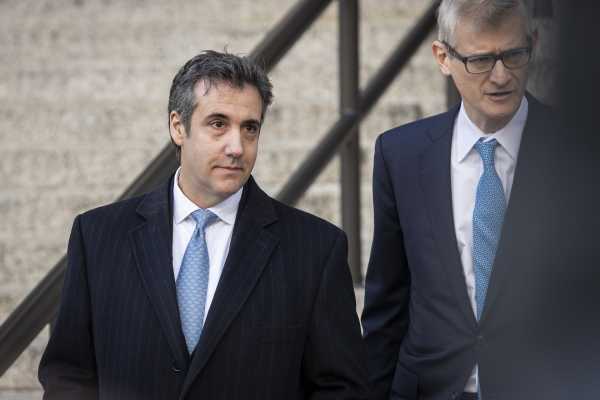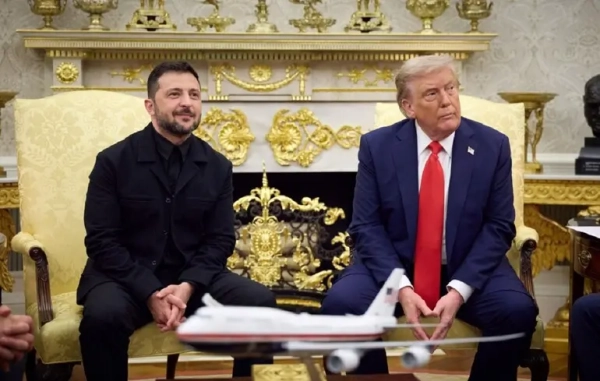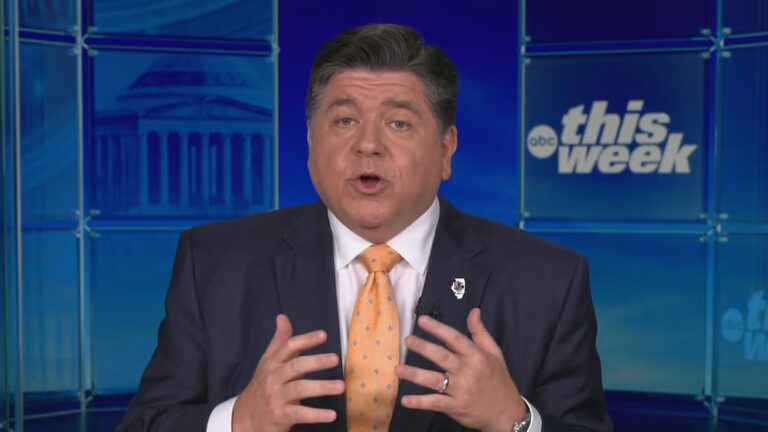
The news that Michael Cohen is cooperating with special counsel Robert Mueller’s probe is significant, but not exactly surprising. He’s been signaling he planned to do so for months, and he already pleaded guilty to separate charges in New York in August.
The big surprise is that Mueller’s new charge against Cohen focuses so heavily on lying to Congress about a project to build a Trump Tower in Moscow.
Trump Tower Moscow (which didn’t end up being built) has been a focus of several news reports about the Russia scandal, but it hasn’t been mentioned in any of Mueller’s charges so far. Now, though, Cohen has admitted to lying to conceal how serious the Trump Tower Moscow project was.
Cohen’s plea reveals Trump’s business tried to work with the Russian government on a major real estate deal while Trump was running for president — and Trump himself was well aware of it, while concealing it from the public.
Specifically, Cohen now admits that the project was still active late into the presidential campaign and that he briefed Trump and Trump family members about it often. And for the first time, Cohen admits he had a detailed phone conversation with an assistant for Russian President Vladimir Putin’s press secretary, in which he asked for the Russian government’s help moving the project forward. He tried to conceal all of this from Congress.
Whether there’s even more to the story isn’t yet clear. The Cohen plea documents reveal some important new information. But they also raise more questions, most notably, whether more charges are coming on Trump Tower Moscow, and whether Cohen is providing damaging information on other topics as well.
1) Trump Tower Moscow was a serious project, and both Trump and the Russian government were involved
Cohen pleaded guilty to lying to Congress in an effort to cover up the full story about the Trump Tower Moscow project.
The project remained a secret during the campaign: Trump had tweeted about his hopes for a Moscow tower in 2013 (around the time he brought the Miss Universe pageant to the city), but there had been no apparent further action since then. And while running for president, Trump denied having any deals in Russia.
Word of the project only first leaked out in August 2017, months after Trump became president. News broke that the Trump Organization had signed a letter of intent to build the Moscow tower in late 2015. It certainly sounded like the sort of project Trump would like. The planned tower was to be 100 stories tall, which would have made it the tallest building in Europe.
The problem: Trump was running for president by late 2015. And key people involved in the project — Cohen and Russian-born developer Felix Sater — were talking about courting Putin’s favor. “I will get Putin on this program and we will get Donald elected,” Sater emailed Cohen. (Sater is “Individual 2” in the new charging documents, while Trump is “Individual 1.”)
So Cohen and Team Trump put out the story last year that, like so many other odd incidents in 2016, Trump Tower Moscow turned out to be a nothingburger.
Yes, it was talked about, Cohen said (in statements to congressional committees), but not very much. He only mentioned it to Trump three times. He did email Vladimir Putin’s press secretary asking for help, but he said he never got a response back. And by the end of January 2016 (just before the Iowa caucuses), Cohen claimed that the company abandoned the project entirely.
But these were lies, according to the new plea documents.
- Cohen in fact talked to Trump about it “more than” three times (it’s not clear how many).
- He also briefed “family members” of Trump about the project.
- His email to Putin’s press secretary Dmitry Peskov was actually answered, and he had a lengthy phone call with Peskov’s assistant about Trump Tower Moscow, after which Putin’s office followed up with Sater.
- And discussions about the project continued for months after January 2016.
The takeaway is that Trump Tower Moscow was a more serious project than Cohen initially wanted to admit. (Though, again, it didn’t end up being built in the end.) The references to Trump and his family also seem significant, and raise questions about what they knew.
2) Cohen says he lied to help Trump
In court Thursday, Cohen said that he “made these statements to be consistent with Individual-1’s political messaging and to be loyal to Individual-1.” (Again, that refers to Trump.)
The charging document also says that Cohen wanted to try and “minimize links between the Moscow Project” and Trump, and to “give the false impression that the Moscow Project ended” before the Iowa caucuses “in hopes of limiting the ongoing Russia investigations.”
However, Cohen does not say that Trump personally told him to lie.
3) What happened with Cohen in June 2016 remains a mystery
As the primary season stretched on, Cohen extensively talked with Sater about two possible trips to Russia for the project, according to the charging document.
One would involve Cohen himself, while the other would be for Trump to meet Putin. (“The 2 big guys,” Sater called them.) Cohen wrote back that he’d go to Russia before the Republican Convention, and Trump could come after it.
The next day, on May 5, 2016, Sater told Cohen that Peskov (Putin’s press secretary) wanted to invite him to the St. Petersburg Forum, a Russian business conference, which would begin on June 16. There, Sater suggested, Cohen might be able to meet Putin. Cohen confirmed he’d go.
But something changed. On June 14, 2016, Cohen met Sater in the lobby of Trump Tower in New York, to tell him he wouldn’t make the trip after all.
The tantalizing question, unanswered in the document, is what changed.
Julian Sanchez points out that certain other things were going on around that time. On June 9, Donald Trump Jr. held his meeting with a Russian lawyer. On June 14, news broke that Russia had hacked the Democratic National Committee. “Did Trump or the campaign decide that obvious links to Russia were suddenly undesirable?” Sanchez asks.
Cohen surely knows the answer — which means Mueller now knows it too.
4) Cohen has been talking to Mueller a lot
Another revelation in the new documents is that Cohen has met Mueller’s team seven times at this point. According to the plea agreement, these meetings started back on August 7, 2018, before he’d even pleaded guilty to other charges in New York, and continued through Tuesday of last week.

The amount of time Mueller’s team is spending with Cohen suggests they view his cooperation as important.
5) Nothing about Prague
For completion, we should note the new plea documents contain no indication that Cohen did in fact visit Prague in 2016 to meet Russians, as Christopher Steele’s infamous dossier claimed.
Cohen has repeatedly and vociferously denied that such a trip happened, including to Congress, and including after he struck his first plea deal in New York. No evidence has emerged to contradict him.
6) The president just answered a Mueller question about Trump Tower Moscow
According to John Santucci of ABC News, Mueller’s questions for President Trump included one about the Trump Tower Moscow project. We don’t know what the exact question was, or Trump’s answer.
But earlier this year, Mueller’s team told Trump’s lawyers certain topics they wanted to ask about, and Trump’s team assembled a list of likely questions that later leaked to the New York Times. One of those questions:
Trump lawyer Rudy Giuliani now claims to the New York Times that the president’s answer to the Trump Tower Moscow question was consistent with what Cohen said today. “The president said there was a proposal, it was discussed with Cohen, there was a nonbinding letter of intent and it didn’t go beyond that,” Giuliani said.
The president submitted his answers to certain Mueller questions (after months of excuses and delays) last week. If Trump lied in those answers, he could be in legal jeopardy for making false statements.
Sourse: vox.com






